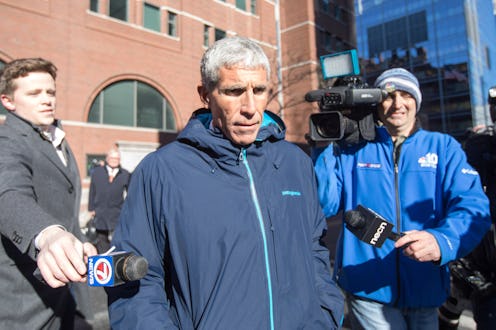Streaming
A Guide To The College Admissions Scam Mastermind’s Many Companies
From Future Stars to The Key.

In March 2019, Rick Singer pled guilty to racketeering, money laundering, conspiracy, obstruction of justice, and tax evasion for his role in the college admissions scandal. As laid out in the new Netflix documentary Operation Varsity Blues, Singer used his companies — Edge College & Career Network, LLC (aka The Key) and the Key Worldwide Foundation — to filter money from wealthy parents to college coaches and SAT exam proctors in order to ensure their children’s admittance to top-tier universities.
Between 2011 and 2018, these parents — including actors Felicity Huffman and Lori Loughlin — paid Singer about $25 million for his services. “All of these things, and many more things, I did,” Singer admitted in court, per CNN, adding that he “very frequently” bribed coaches on his clients’ behalf. “I created a side door that would guarantee families would get in.”
As Singer, who agreed to cooperate with the government’s investigation, awaits sentencing, here’s everything to know about the companies he used to pull off the the largest college admissions scam the Department of Justice has ever prosecuted.
Future Stars
After landing a basketball coaching job at Sacramento State in 1989, Singer established Future Stars, a company that provided private college counseling for student athletes. He reportedly charged a $1,200 fee to help parents and their children “understand college entrance exams,” per The Sacramento Bee. “I’d bring Rick in so he could present his program if any kids needed that sort of help,” Singer’s fellow Sacramento State assistant coach Ron McKenna, who was also a high school counselor in the ‘90s, explained to the paper. “He counseled a lot of kids in Sacramento.”
According to USA Today, Singer enjoyed working with kids but didn’t like running the business. He sold the company to another local counselor named Scott Hamilton and went on to work in various call center management jobs.
The CollegeSource LLC
Singer re-entered the college counseling business in 2002, starting his second company, The CollegeSource LLC. A 2005 profile in the Sacramento Business Journal reported that Singer provided one-on-one guidance at a price of $1,500 a year for high school freshmen, $2,000 for sophomores, and $2,500 a year for juniors or seniors. At the time, CollegeSource, which employed a dozen coaches, three administrative staff and some part-time workers, was reportedly serving 724 students and generated more than $1 million in revenue in 2004, per the outlet. The company’s advisory board included the president emeritus of Stanford, the director of the Carnegie Foundation, and the president of Occidental College.
USA Today reported that a large part of the business involved working with small, private schools that didn't have their own in-house college counselors, including the University of Miami Online High School, in which Singer claimed to have an ownership interest. He said he sold his interest in the school to Kaplan Inc. for $100 million in 2007. (Kaplan announced the acquisition at the time but did not disclose the sale price, per the paper.)
The Key & Key Worldwide Foundation
In 2007, Singer founded the Edge College & Career Network, LLC, a for-profit, referral-based college counseling and preparation business also known as "The Key.” Prior to the company’s eventual closure, its website reportedly touted “many of the world’s most renown families and individuals” as being among Singer’s clients. The Key also claimed that Singer and his team had “helped more than 90,000 adults and also guided high school and college students seeking undergraduate or graduate degrees.”
The company offered legitimate college counseling services, though Singer later admitted he’d used The Key to arrange bribes for his well-connected clients. Federal prosecutors allege that Singer created his purported charity, the Key Worldwide Foundation, in or around 2013 “to disguise bribe payments, at least in part, as charitable contributions” from his Key clients. At Singer’s direction, Key Worldwide Foundation employees allegedly sent clients false acknowledgment letters which stated that no goods or services were exchanged for their donations.
Federal prosecutors say that between approximately 2011 and February 2019, Singer conspired with dozens of parents, athletic coaches, a university athletics administrator, and others, to facilitate “cheating on college entrance exams and the admission of students as purported athletic recruits to elite colleges and universities including: Yale University, Georgetown University, Stanford University, the University of Southern California, and Wake Forest University, among others.
Versatile PhD & Getting In To College
Singer’s Key Worldwide Foundation purchased Versatile PhD, a career networking site for graduate students, in 2018. The website is still fully functional, but Singer agreed in a plea deal to forfeit the foundation's interests, including those in Versatile PhD. The website’s new president, Todd Maurer, told Inside Higher Ed in March 2019 that Versatile Ph.D. “operates independently” and anticipated that it would “continue under new ownership, in some form, into the future."
Another venture Singer had was a website called Getting In To College, which claimed to be "the one-of-a-kind, one-stop shop for finding and getting into the right college for you," according to a business plan obtained by the Los Angeles Times. For $349 to $1,800, students could work with a college counselor through the website, which was reportedly taken down shortly after Singer’s March 2019 guilty plea.
This article was originally published on